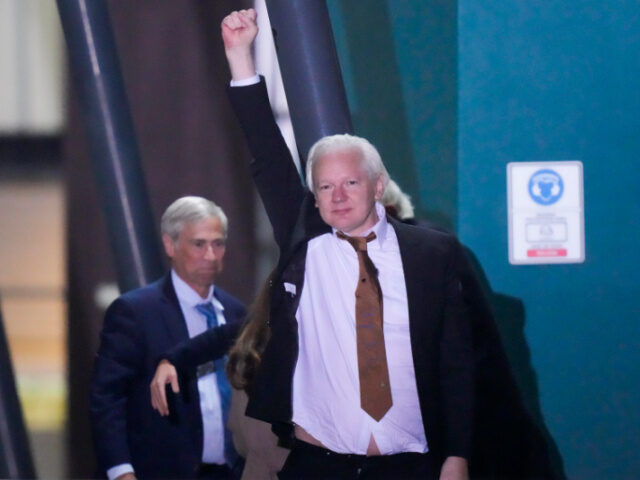The U.S. government accepted a plea deal to free WikiLeaks founder Julian Assange to expand its anti-Chinese joint activities with Assange’s native Australia, the Chinese state media outlet Global Times proclaimed on Wednesday.
The Chinese government – the world’s most prolific jailer of journalists – called Assange’s extended time in detention “unjust and unfortunate” in the pages of the Global Times and claimed that Washington taking action in the face of the publication of large volumes of classified documents “basically tells the world US political power can crush any form of freedom.”
Assange rose to prominence as an online personality after using WikiLeaks as a vehicle to publish sensitive American military documents and media. Among the most prominent publications was that of a video showing an airstrike by U.S. forces in Baghdad, published in 2010 under the title “Collateral Murder.” Assange’s WikiLeaks also published troves of unredacted confidential documents related to the wars in Iraq and Afghanistan, which detractors feared compromised the safety of Afghan collaborators with U.S. forces whose identities WikiLeaks did not protect.
The Department of Justice charged Assange with a variety of crimes related to espionage and disclosing classified intelligence in 2019. He had faced legal woes long before then, however, prompting him to take refuge in the Ecuadorian embassy in London for seven years before Quito expelled him, disparaging him as a poor guest.
Assange arrived home in Australia on Wednesday after pleading guilty in an agreement with the U.S. government that resulted in his release.
The Chinese Communist Party has for years accused the United States of persecuting Assange for disclosing unflattering information, a charge the Global Times repeated this week. The state newspaper added to this, however, the novel claim that Washington chose to release Assange to strengthen its efforts against Chinese Communist Party influence in the South Pacific.
“Not only did the US intimidate people trying to expose US’ dirty laundries, but it also removed one obstacle in its relationship with Australia, where Assange is from and where there has been advocacy for his release,” the Times claimed. “Consolidating coordination with Australia can help the US counter China’s influence in the Western Pacific region through the creation of alliances, said experts.”
The Global Times claimed that the deal was in part the result of Anthony Albanese taking over as prime minister of Australia in 2022. The prime minister, a leftist, has presided over a China-friendly government and made Assange “a priority,” the Chinese newspaper alleged.
The “expert” cited in the Global Times as suspecting anti-China motives for freeing Assange, Professor Li Haidong, insisted that “Washington had the current Asia-Pacific situation in mind when deciding to settle the case.”
“The US and Australia have strong cooperation in both political and security aspects,” Li claimed, according to a summary by the Global Times. “Strengthening cooperation with Australia can help US counter China’s influence in the Western Pacific region through the creation of alliances.”
Elsewhere in its coverage, the Global Times returned to its more traditional condemnation of Assange’s arrest as a violation of human rights.
“People who tell the truth have to confess in exchange for ‘freedom’ – the fate of Assange demonstrates that the ‘free beacon’ of the US has ultimately collapsed,” the outlet grimly concluded. In reality, the charges against Assange were not related to any statements or expressions that he had made but, rather, the publication of confidential government materials.
The Chinese Communist Party’s accusations against America follow decades of engaging in some of the world’s most violent repression of free speech, including journalism. The Committee to Protect Journalists (CPJ) once again crowned China the world’s worst jailer of journalists in 2023 in its annual report published in January, identifying 44 imprisoned journalists. Of these, 19 were identified as being ethnic Uyghurs, belonging to a group against which the Chinese state is currently conducting genocide.
Some of China’s most high-profile repression of journalism in recent memory has occurred in Hong Kong, once an autonomous territory that the Communist Party crushed in response to widespread anti-communist protests in 2019. China passed a “national security” law in 2020 that heavily punished those found guilty of crimes such as “supporting secession,” “subverting state power,” and engaging in “terrorism.”
The Chinese government moved swiftly to crush the largest anti-communist publication in Hong Kong, Apple Daily, which shut its doors shortly after the passage of the “national security” law and the arrest of its owner, Catholic media mogul Jimmy Lai. Lai, 76, has been in prison since 2020, accused of “masterminding” the 2019 protests for participating in them and covering them in Apple Daily.
China’s repressive behavior towards journalists has attracted global condemnation, including from Assange himself. Prior to the criminal charges against him, Assange condemned China in interviews and asserted that WikiLeaks was interested in publishing Chinese state secrets as well as American ones.
In a 2010 interview with the left-wing newspaper The Guardian, Assange described Chinese officials as “terrified of free speech.”
“Journalism and writing is capable of achieving change which is why Chinese authorities are so scared of it,” Assange said at the time.
RELATED: Julian Assange’s Wife Speaks at “Free Assange” Rally in London Ahead of Extradition Decision

COMMENTS
Please let us know if you're having issues with commenting.